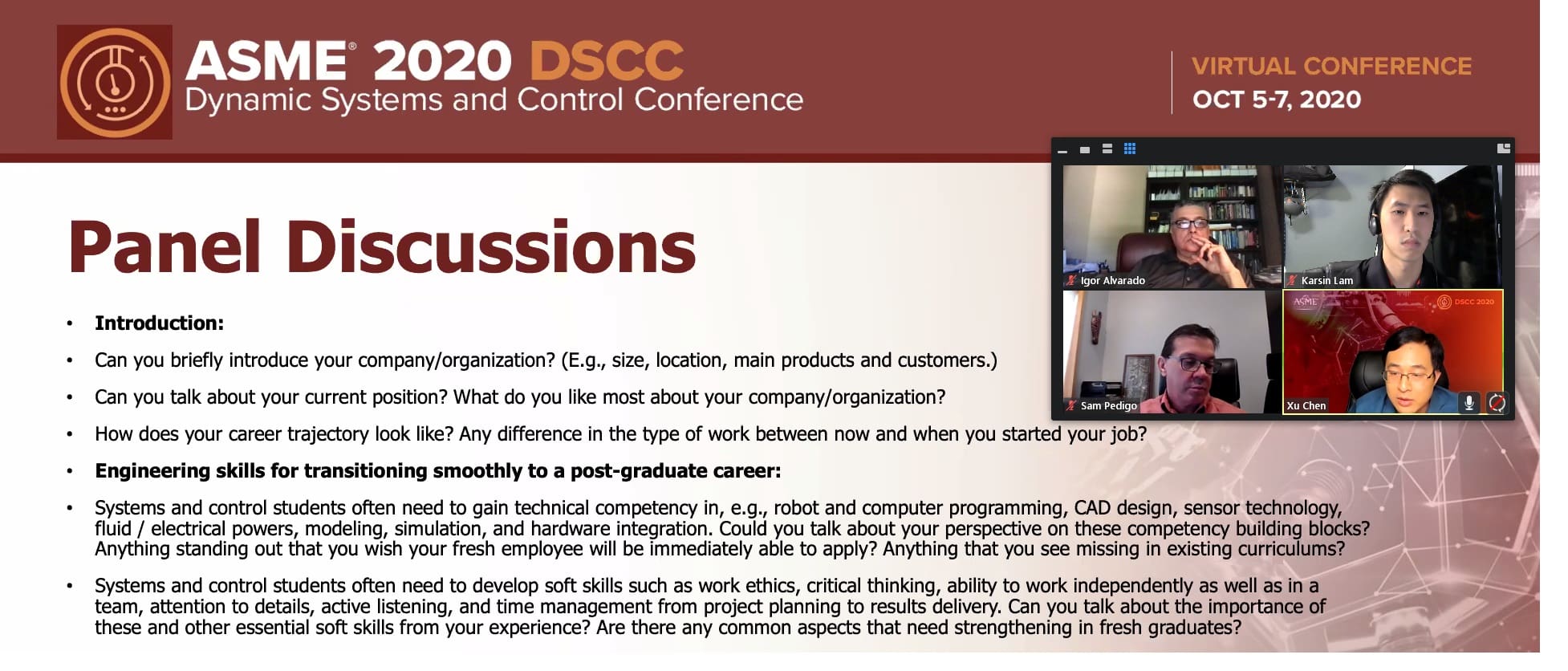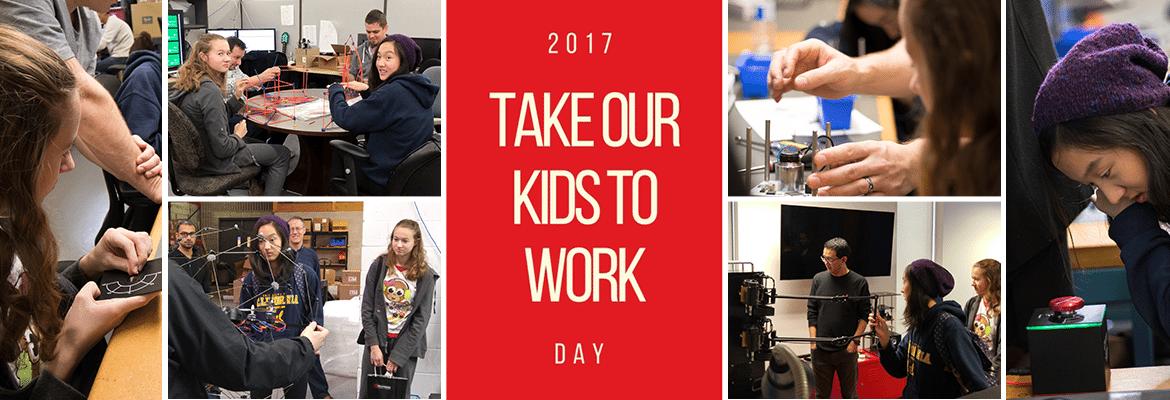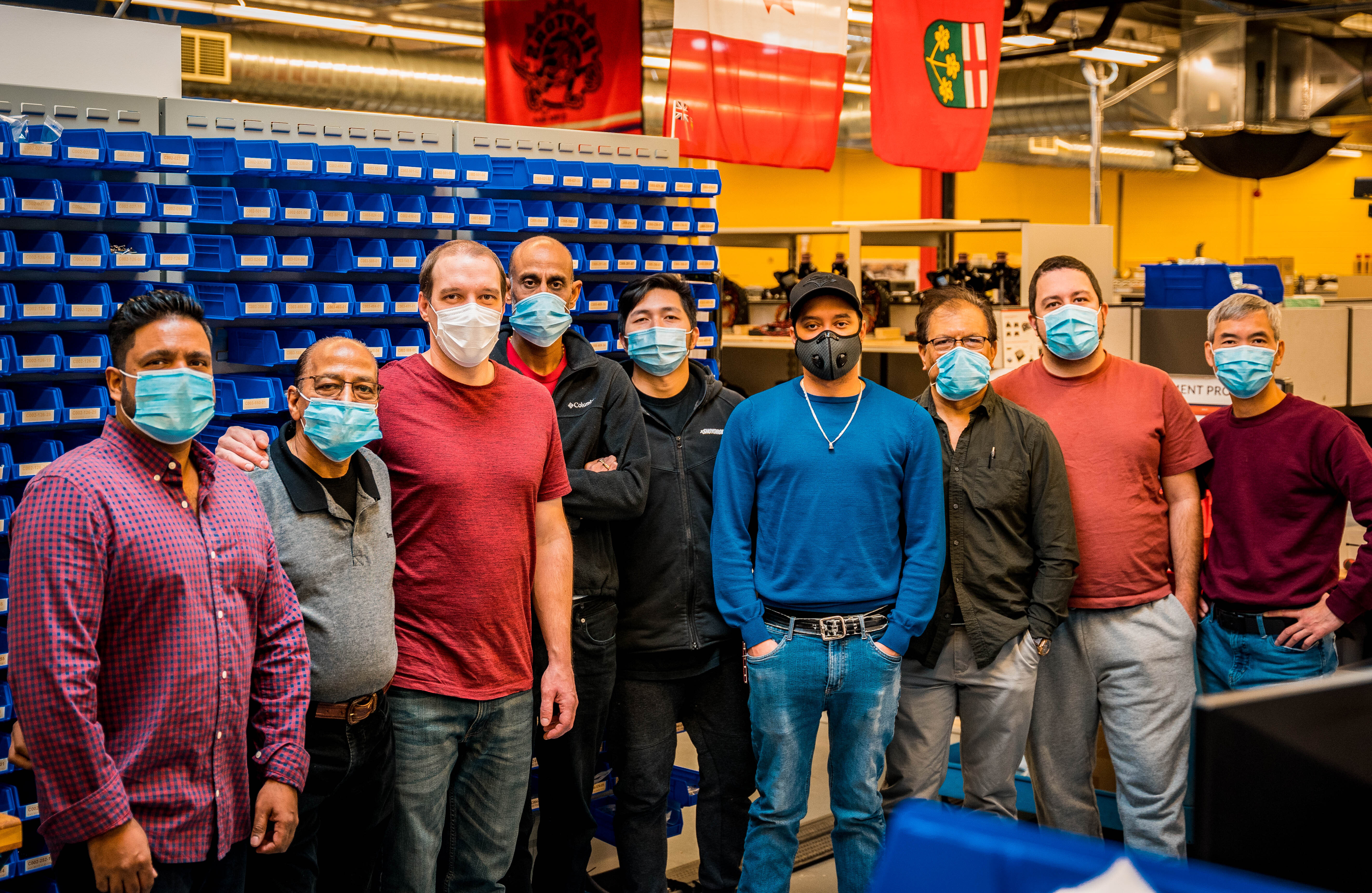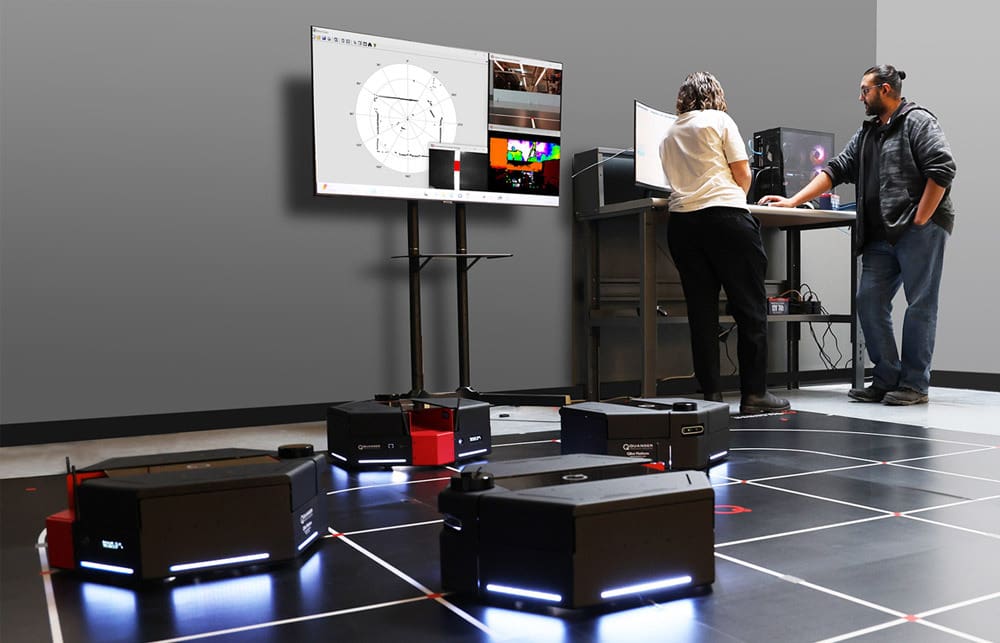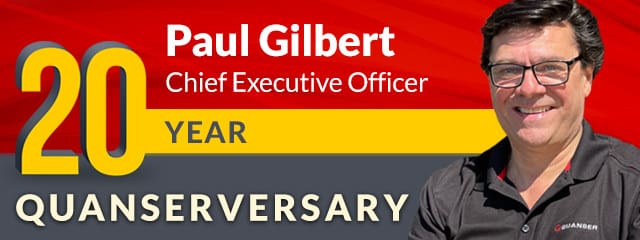
Episode 4: The People We Serve and What’s Next
Quanser has provided me with an incredibly fulfilling role, unlike any other company I have worked for over my career. An important element in creating that fulfilment is the quality of service and support we have been able to provide to the academic community. I am so proud of our ability to enable our customers to succeed in their endeavours; namely effectively educating the next generation of engineers and validating high-quality research to introduce innovative solutions to the world.

Over the 20 years I have been at Quanser, we have seen our platforms cited in research that has influenced so many domains that I cannot possibly do it justice in this blog. One only has to browse our collection of over 2,300 research papers to see the incredible variety of topics where Quanser platforms have been used.
A few notable themes include:
- Serial robotics: Today, robotic ‘manipulators’ are used in countless manufacturing settings. Our platforms have been heavily involved in the evolution of performance.
- Haptic robotics: Remote teleoperation and surgery, with a sense of touch, is a fast-growing field. Quanser haptic technology has been there since the early 2000s.
- Collaborative Drones: Quanser developed a platform for collaborative and reconfigurable control back in 2006, which led to our Autonomous Vehicles Research Studio. Over 100 research labs now use the QDrone for their work.
- Self-Driving Cars: In less than 3 years over 70 institutions have installed a Quanser Self-Driving Car Studio. This area of research will impact everyone in the world.
Over the years, as I mentioned in an earlier blog discussing our technical evolution, we have taken much of our learning from advanced research platforms and brought it into our teaching solutions. This has allowed us to ensure that our teaching solutions remain technologically relevant and motivational for undergraduate engineers. However, that is not the driving force influencing the development of our products and the curriculum we develop for teaching and learning. We consider the most critical factor to be: “what do today’s faculty want to teach their students?”. We have been asking this question continuously over the last twenty years and, naturally, have reviewed and debated all kinds of answers!
For many of our early years the control courses were typically programmed in the second or third year and often were electives that might or might not be chosen by students. Of course, this varied all over the world. Some countries introduced more controls earlier, but for the most part, labs using Quanser equipment for teaching were not mandatory.
We saw the introduction of early Mechatronics programs at home in Canada at the University of Waterloo back around the time I started at Quanser in 2002, and over the years, an increasing interest in specialty courses and clubs for robotics, drones and autonomous vehicles.
Thanks to the inspiration of many innovative programs worldwide, we now find our equipment being used for teaching in multiple programs, from measurements to self-driving in the first year all the way to graduate teaching courses. In addition, since we work very closely with universities worldwide, we have now developed a large variety of project-based learning labs. We have been involved in the use of our equipment in capstone design programs in a variety of places.
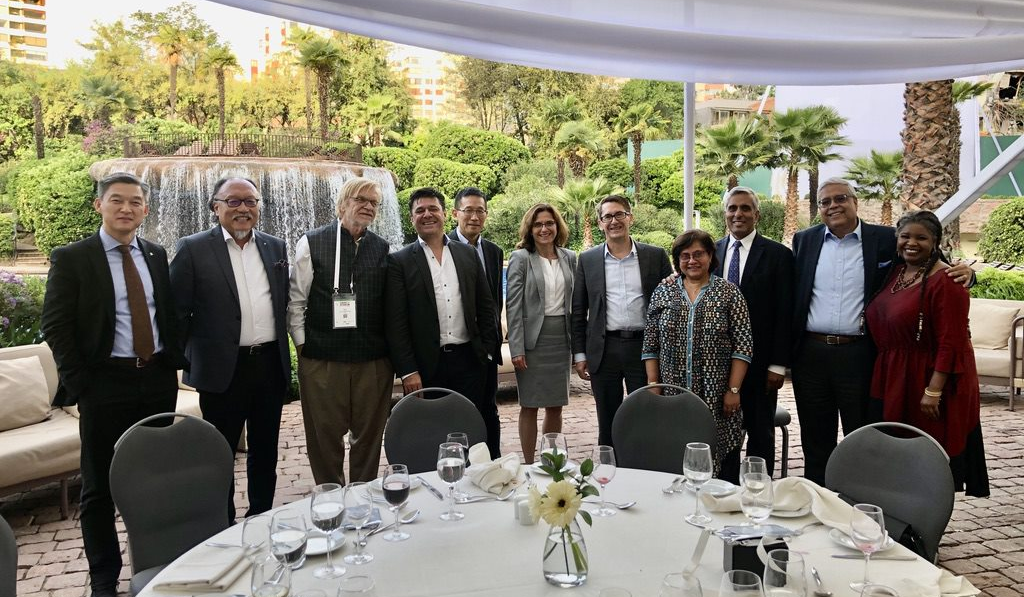
Paul Gilbert with members of the Global Engineering Deans Community in Santiago, Chile. (October 2019)
The world has also witnessed a rapid increase in usage of and dependence on the internet and intelligent devices. In 2002 there was no smartphone. The phrase “Internet of Things” had only just been coined (but the world was unaware), and we were blissfully ignorant about the impact social media would have on our lives. To say things have changed radically in the last 20 years would be a colossal understatement. The young engineers graduating now are entering a world completely different from the one I graduated into, but more importantly, radically different from the world only 10 or 20 years ago. More complicated systems drive the technological world, and solutions in every domain can be integrated into an entirely interconnected world.
The implications for the future of engineering education are profound. No longer is it OK for students of all disciplines to graduate without a basic understanding of complex systems. Each design they work on will be integrated into a complex system, and they will have to be able to work with engineers from multiple disciplines. Software engineers will have to be able to communicate effectively with Mechanical, Electrical, Electronic, and Civil Engineers etc., and they will have to reciprocate. Otherwise, simply put, the systems will not function.
Quanser is a natural partner for this evolution since all our platforms, supporting software and curriculum are completely aligned with the notion of intelligent devices that sense the world around them, perform a specific function(s) and communicate with other devices. This is exactly what we have been doing for 30 years, but now the interest is much broader from all engineering disciplines.
This has led to a very exciting period for Quanser as we are now able to engage more profoundly and deeply with our University partners around the world. Over the last five years or more, I have, along with other senior members of the Quanser team, spent much of my time meeting academic engineering leaders from around the world. My goal has been to identify those willing and able to significantly transform their undergraduate experience to ensure the students have a modern perspective on the engineering world and more authentic experiences in the lab during their time at university.
We have had some fantastic achievements at many locations, which you can learn about in some of our customer success stories , but for now, I will highlight just a couple of recent examples that I am particularly proud of. These are just two cases where our relationship with the academic community developed into one where we saw each other as true colleagues with a common goal.
McMaster University, Canada:
In September of 2020, McMaster University started “The Pivot” program. The program was a brand-new First Year Engineering Education approach that (amongst other things) introduced an authentic design experience for all new engineering students. We agreed to work with them to develop a five-module design program, which replaced three courses but maintained the learning outcomes, utilizing Quanser hardware. In addition, we planned to work with McMaster faculty to develop a project-based approach to introducing key fundamental principles in the context of a real design project – A recycling application with serial and mobile robots.
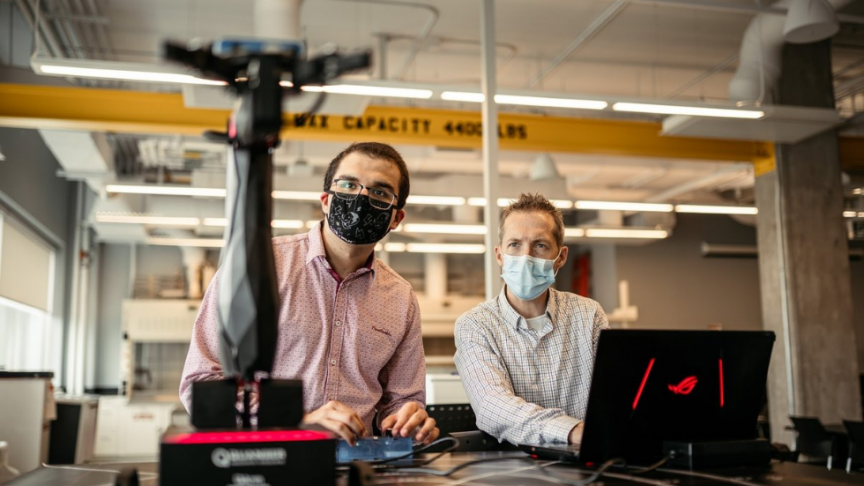
Engineering student AJ Kourabi (left) and Prof. Colin McDonald from McMaster University testing the Quanser QArm for a student design project. Photo by Geoff Shaw.
If you remember, that was a challenging year. All students spent their time at home studying remotely. For Engineering programs, it was particularly difficult to provide quality lab experiences. I am incredibly proud that our relationship with McMaster, particularly Dean Ishwar Puri and his unbelievable team, developed a digital experience that simulated the original plan we had for the hardware.
To cut a long story short, the Pivot was a success, and over 3000 students have benefited from the new approach. Not only that, the course was rated exceptionally highly, resulting in a 99% retention rate, and the highest-ever request for transfers into the program from students at other Universities. I encourage you to learn more about their remarkable program.
The University of Manchester, UK:
Midway through 2021, our discussions with The University of Manchester, in particular Dr. Alexander Lanzon, Chair of Control Engineering moved from a simple supply of equipment to the possibility of a deeper relationship. Dr. Lanzon and his colleague Dr. Long Zhang were keen to exploit the Quanser technology as much as possible while maintaining complete control over the strategic approach to delivering all the learning outcomes for over a dozen control courses.
It became apparent that the quality of faculty-equivalent engineers Quanser has on our team was able to promise the University of Manchester the opportunity to develop world-class hands-on experiences in their controls lab. The scope of the curriculum development ranges from introductory principles to very advanced Masters level concepts. Not only were we able to come to an agreement to supply the hardware and develop the courseware alongside Manchester faculty, but we also developed an understanding that Quanser would provide strategic research grant application support, and ultimately we penned a 10-year strategic agreement. Our relationship is now very close, and we expect that as we spend more time with Manchester faculty, more and more collaborations will be possible. We anticipate this will lead to an even higher quality of experience for their engineering students.
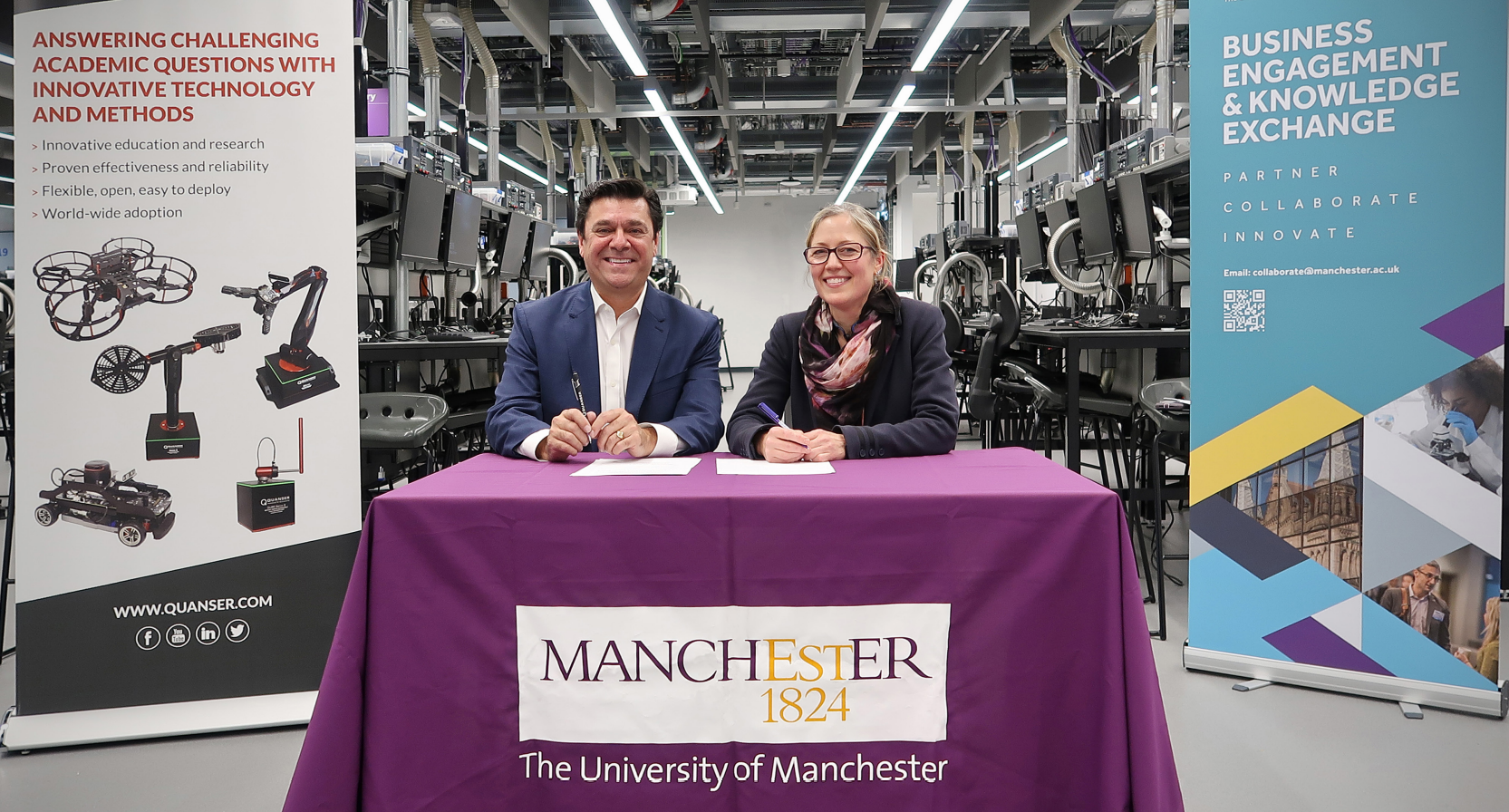 Paul Gilbert and the Head of the School of Engineering Prof. Alice Larkin
Paul Gilbert and the Head of the School of Engineering Prof. Alice Larkin
Hopefully, as you read this blog, you will appreciate our commitment to supporting so many incredible professors and researchers around the world. I have only been able to comment on a fraction of the incredible interactions and collaborations I have had with so many wonderful people over the last 20 years. I want to thank you all for being a part of my personal journey and for helping Quanser to realize the dream of raising the bar for engineering education and research.
I am fortunate to have been able to have this period at such an amazing company and to work with so many genuinely talented professionals over the years. In addition to my Quanser colleagues, I can say categorically that over this time, I have lost count of how many people have started as customers, moved on to become great partners and, eventually, amazing friends.
Many thanks to everyone who has made that possible for me.
